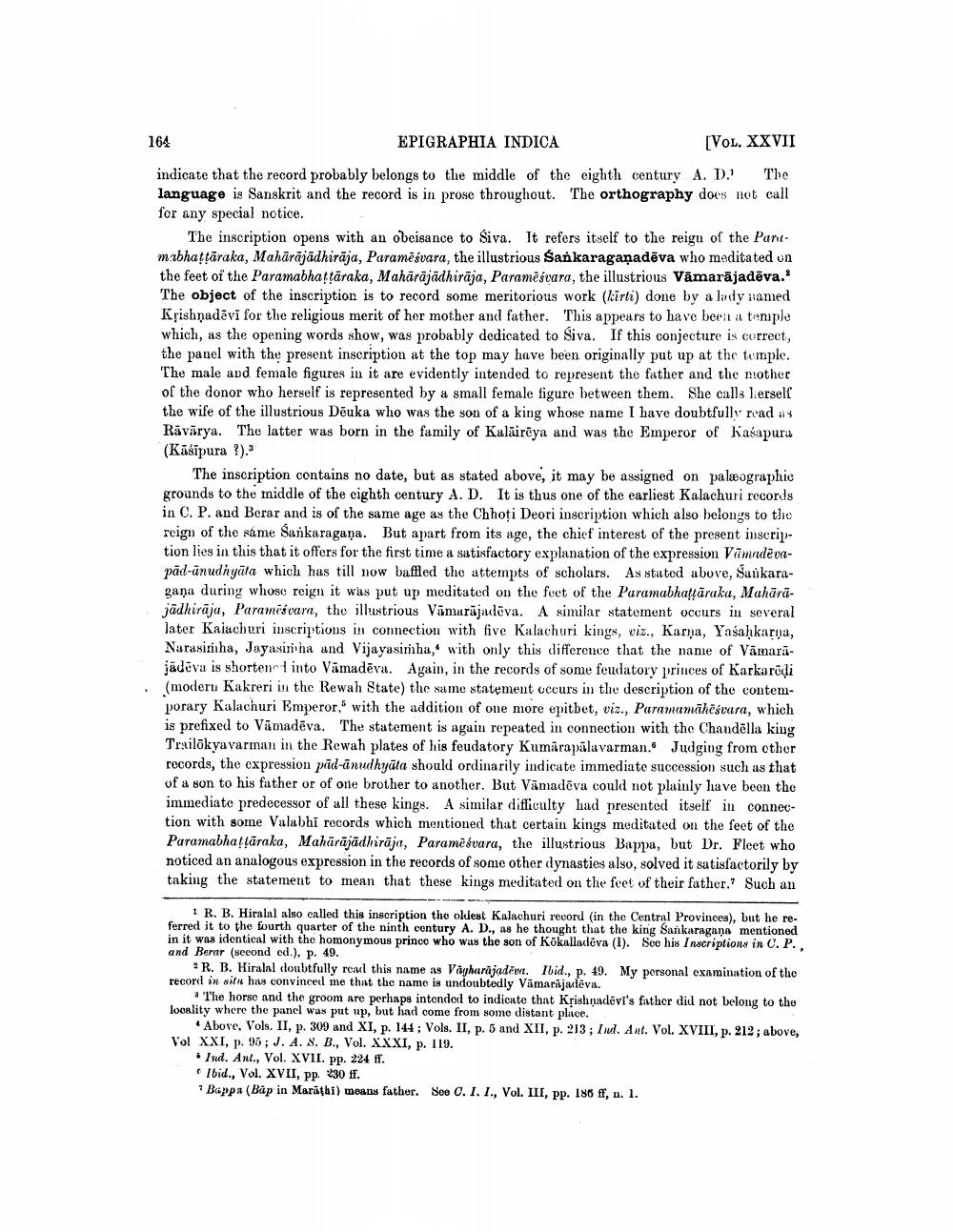________________
164
EPIGRAPHIA INDICA
[Vol. XXVII
indicate that the record probably belongs to the middle of the eighth century A. D. The language is Sanskrit and the record is in prose throughout. The orthography does not call for any special notice.
The inscription opens with an obeisance to Siva. It refers itself to the reign of the Pantmabhattaraka, Mahārājādhirāja, Paramēsvara, the illustrious Sankaraganadēva who meditated on the feet of the Paramabhattāraka, Mahārājādhirāja, Paramësvara, the illustrious Vämarājadēva. The object of the inscription is to record some meritorious work (kiri) done by a lady named Krishnadēvi for the religious merit of her mother and father. This appears to have been at temple which, as the opening words show, was probably dedicated to Siva. If this conjecture is correct, the panel with the present inscription at the top may have been originally put up at the temple. The male and female figures in it are evidently intended to represent the father and the mother of the donor who herself is represented by a small female figure between them. She calls herself the wife of the illustrious Déuka who was the son of a king whose name I have doubtfully read as Rāvārya. The latter was born in the family of Kalaireya and was the Emperor of Kasapura (Kāśipura ?).
The inscription contains no date, but as stated above, it may be assigned on palæographic grounds to the middle of the eighth century A. D. It is thus one of the earliest Kalachuri records in C. P. and Berar and is of the same age as the Chhoti Deori inscription which also belongs to the reign of the same Šankaragana. But apart from its age, the chief interest of the present inscription lies in this that it offers for the first time a satisfactory explanation of the expression Vimdēvapād-ūnudnyāta which has till now baffled the attempts of scholars. As stated above, Saúkaragana during whose reign it was put up meditated on the feet of the Paramabhattāraka, Mahārājādhiraja, Paramēr varn, the illustrious Vāmarājadēva. A similar statement occurs in several later Kaiachuri inscriptions in connection with five Kalachuri kings, viz., Kamna, Yaśaḥkarna, Narasirinha, Jayasinha and Vijayasimha,' with only this difference that the name of Vāmarajädēva is shortene tinto Vámadēva. Again, in the records of some feudatory princes of Karkarodi (moderu Kakreri in the Rewah State) the same statement occurs in the description of the contemporary Kalachuri Emperor, with the addition of one more epitbet, viz., Paramamakešvara, which is prefixed to Vámadēva. The statement is again repeated in connection with the Chaudēlla king Trailökyavarman in the Rewah plates of his feudatory Kumarapalavarman. Judging from other records, the expression pūd-anudhyāta should ordinarily indicate immediate succession such as that of a son to his father or of one brother to another. But Vāmadova could not plainly have been the immediate predecessor of all these kings. A similar difficulty had presented itself in connection with some Valabhi records which mentioned that certain kings meditated on the feet of the Paramabhatļāraka, Mahārājādhirāja, Paramēšvara, the illustrious Bappa, but Dr. Fleet who noticed an analogous expression in the records of some other dynasties also, solved it satisfactorily by taking the statement to mean that these kings meditated on the feet of their father.' Such an
1 R. B. Hiralal also called this inscription the oldest Kalachuri record in the Central Provinces), but he re. ferred it to the fourth quarter of the ninth contury A. D., as he thought that the king Sankaragana mentioned in it was identical with the homonymous prince who was the son of Kokalladora (1). Soo his Inscriptions in O.P. and Berar (second ed.), p. 49.
R. B. Hiralal doubtfully real this name as VagharijadFurt. Ibid., p. 49. My personal examination of the record in wit has convinced me that the name is undoubtedly Vámarajaleva.
* The horse and the groom are perhaps intended to indicate that Krishnadēvi's father did not belong to the locality where the panel was put up, but had come from some distant place.
Above, Vols. II, p. 309 and XI, p. 144; Vols. II, p. 5 and XII, p. 213; Iul. Ant. Vol. XVIII, p. 212; above, Vol XXI, p. 95; J. A. S. B., Vol. XXXI, p. 119.
• Ind. Ant., Vol. XVII. pp. 224 ff.
Ibid., Vol. XVII, pp. 230 ff. * Bappa (Bap in Marathi) means father. See C. I. I., Vol. III, pp. 180 ff, n. 1.




